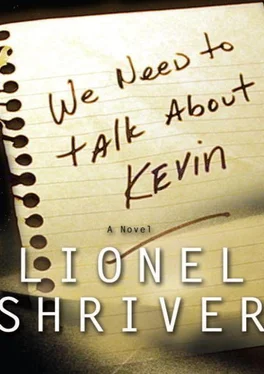It was shortly after Siobhan jumped ship (she never did come back, and I had to post her last paycheck to AmEx in Amsterdam) that Kevin stopped screaming. Stopped cold. Maybe, his nanny dispatched, he felt his mission accomplished. Maybe he’d finally concluded that these high-decibel workouts did not reprieve him from the remorseless progress of life-in-a-room and so were not worth the energy. Or maybe he was hatching some new gambit now that Mother had grown inured to his wailing, as one does in the latter stages of a neglected car alarm.
While I was hardly complaining, Kevin’s silence had an oppressive quality. First off, it was truly silence—total, closed-mouth, cleansed of the coos and soft cries that most children emit when exploring the infinitely fascinating three square feet of their nylon net playpen. Second, it was inert. Although he was now able to walk—which, like every skill to come, he learned in private—there didn’t appear to be anywhere he especially wanted to go. So he would sit, in the playpen or on the floor, for hours, his unlit eyes stirring with an unfocused disaffection. I couldn’t understand why he didn’t at least comb up a little aimless fluff from our Armenian rugs, even if he refused to loop colored rings on their plastic spike or crank the noisemaker on his Busy Box. I would surround him with toys (there was hardly a day you didn’t come home with a new one), and he would stare at them or kick one away. He did not play.
You’d remember that period largely as the time we were fighting about whether to move and whether I would take that long trip to Africa. But I mostly remember staying home on those draggy days after we’d once again lost a nanny, and mysteriously they did not pass any faster than the ones during which Kevin bellowed.
Previous to motherhood I had imagined having a small child at elbow as something like owning a bright, companionable dog, but our son exerted a much denser presence than any pet. Every moment, I was hugely aware he was there. Though his new phlegmatism made it easier to edit copy at home, I felt watched and grew restive. I’d roll balls to Kevin’s feet, and once I did entice him into rolling it back. Excited, ridiculously so, I rolled it back; he rolled it back. But once I rolled it between his legs a third time, that was that. With a listless glance, he left the ball at his knee. I did begin to think, Franklin, that he was smart. In sixty seconds, he got it: Were we to pursue this “game,” the ball would continue to roll back and forth along the same trajectory, an exercise that was overtly pointless. I was never able to engage him in it again.
This impenetrable flatness of his, combined with a reticence extending well past the point that all your manuals forecast first attempts at speech, compelled me to consult our pediatrician. Dr. Foulke was reassuring, ready with the conventional parental sop that “normal” developmental behavior embraced a range of idiosyncratic stalls and leaps, though he did subject our son to a battery of simple tests. I’d expressed concern that Kevin’s unresponsiveness was due to a hearing deficit; whenever I called his name, he turned with such an in-his-own-good-time deadpan that it was impossible to tell whether he had heard me. Yet though he was not necessarily interested in anything I said, his ears worked fine, and my theory that the volume of his infantile screaming had damaged his vocal chords was not borne out by medical science. I even voiced a worry that Kevin’s withdrawn quality might indicate early signs of autism, but apparently he did not display the telltale rocking and repetitive behavior of such unfortunates trapped in their own world; if Kevin was trapped, it was in the same world as yours and mine. In fact, the most I wrested from Dr. Foulke was his musing that Kevin “was a floppy little boy, wasn’t he?” in reference to a certain physical slackness. The doctor would lift our son’s arm, let go, and the arm would drop like a wet noodle.
So insistent was I that Foulke pin a disability to our son, stamp a name-brand American syndrome on Kevin’s forehead, that the pediatrician must have thought me one of those neurotic mothers who craved distinction for her child but who in our civilization’s latter-day degeneracy could only conceive of the exceptional in terms of deficiency or affliction. And honestly, I did want him to find something wrong with Kevin. I yearned for our son to have some small disadvantage or flaw to kindle my sympathy. I was not made of stone, and whenever I espied a little boy with a piebald cheek or webbed fingers waiting patiently in the outer office, my heart went out to him, and I quivered to consider what tortures he would suffer at recess. I wanted to at least feel sorry for Kevin, which seemed a start. Did I truly wish our son to have webbed fingers? Well, yes, Franklin. If that’s what it took.
He was underweight, in consequence of which he never had those rounded, blunt features of the roly-poly toddler that can make even homely children adorable for that photogenic window between two and three. Instead his face had that ferret-like sharpness from his earliest years. If nothing else, I’d have liked to have been able to gaze later at photographs of a pudgy heartbreaker and wonder what went wrong. Instead, the snaps I have (and you took stacks) all document a sobersided wariness and disturbing self-possession. The narrow olive face is instantly familiar: recessed eyes, sheer straight nose with a wide bridge and slight hook, thin lips set in an obscure determination. Those pictures are recognizable not only for their resemblance to the class photograph that appeared in all the papers but for their resemblance to me.
But I wanted him to look like you. His whole geometry was based on the triangle and yours on the square, and there is something cunning and insinuating about acute angles, stable and trustworthy about the perpendicular. I didn’t expect to have a little Franklin Plaskett clone running around the house, but I wanted to glance at my son’s profile and apprehend with a flash of lambent joy that he had your strong tall forehead—rather than one that shelved sharply over eyes that might begin as strikingly deep-set but were destined with age to look sunken. (I should know.) I was gratified that his appearance was noticeably Armenian, but I had hoped that your robust Anglo optimism would quicken the sluggish, grudge-bearing blood of my Ottoman heritage, brightening his sallow skin with ruddy hints of football games in fall, highlighting his sullen black hair with glints of Fourth of July fireworks. Moreover, the furtiveness of his gaze and the secrecy of his silence seemed to confront me with a miniature version of my own dissembling. He was watching me and I was watching me, and under this dual scrutiny I felt doubly self-conscious and false. If I found our son’s visage too shrewd and contained, the same shifty mask of opacity stared back at me when I brushed my teeth.
I was averse to plunking Kevin in front of the television. I hated children’s programming; the animation was hyperactive, the educational shows boppy, insincere, and condescending. But he seemed so understimulated. So one afternoon when I had burned out on bubbling, It’s time for our juice! I switched on the after-school cartoons.
“I don like dat.”
I reeled away from the beans I was tailing for dinner, certain from the lifeless monotonic delivery that this line had not escaped from the A-Team. I rushed to turn the TV down low and stooped to our son. “What did you say?”
He repeated levelly, “I don like dat.”
With more urgency than I may ever have applied to this foundering relationship, I took one of his shoulders in each hand. “Kevin? What do you like ?”
It was a question that he was not prepared to answer and that to this day at the age of seventeen he is still unable to answer to his own satisfaction, much less to mine. So I returned to what he didn’t like , a subject that would soon prove inexhaustible.
Читать дальше












